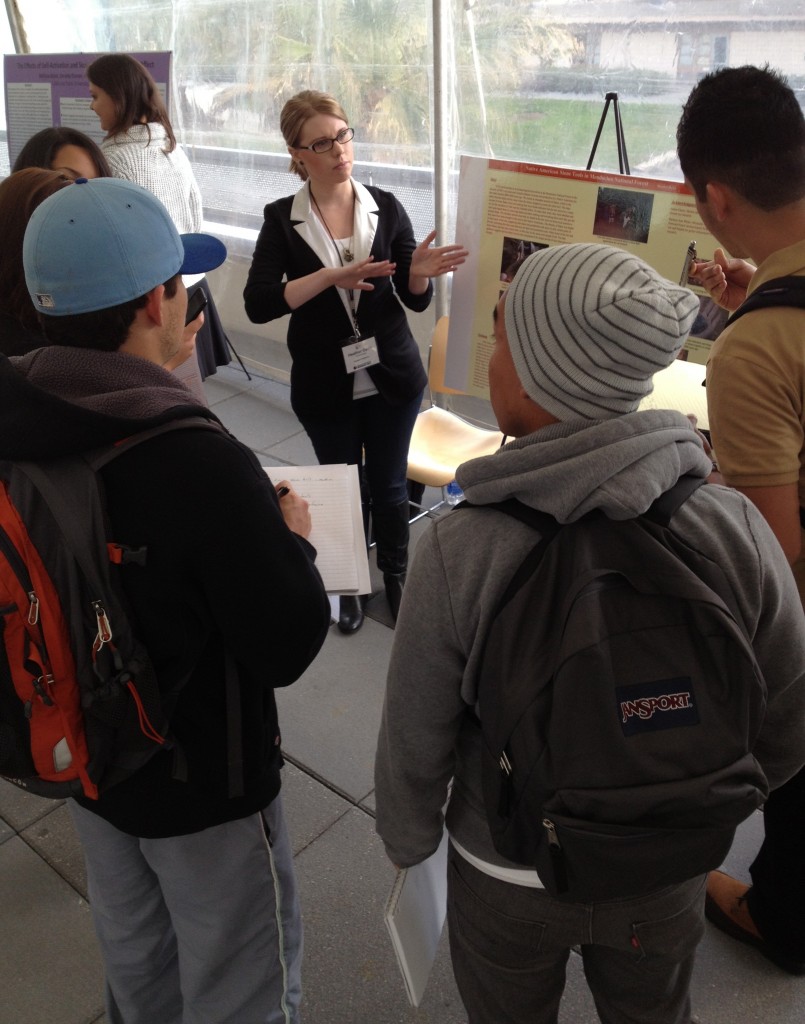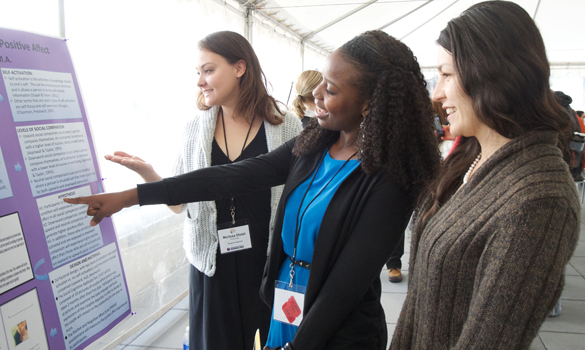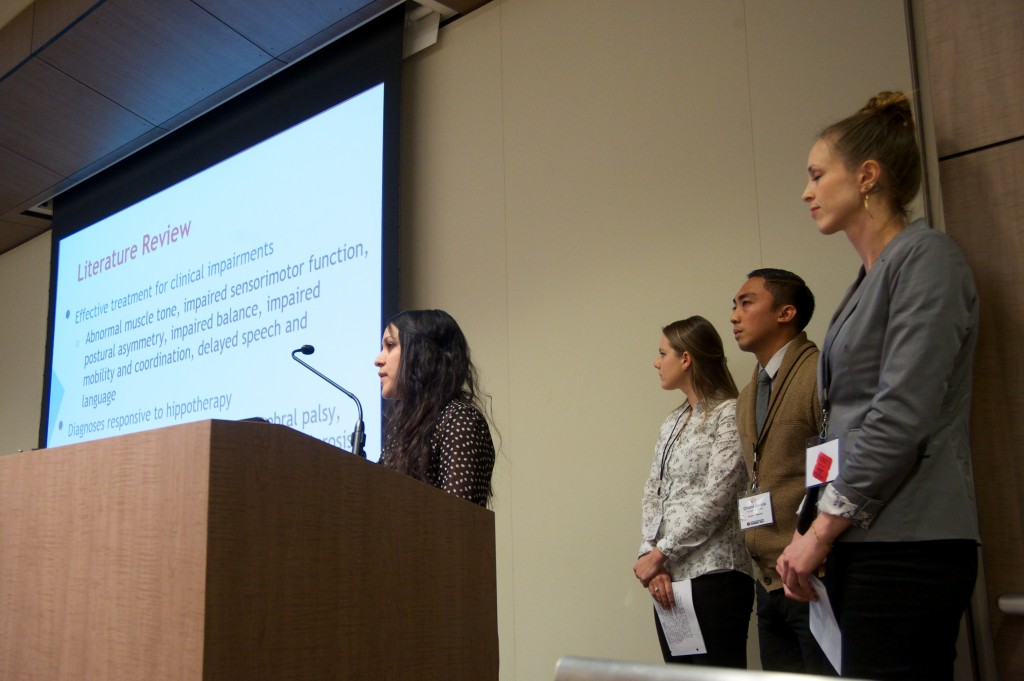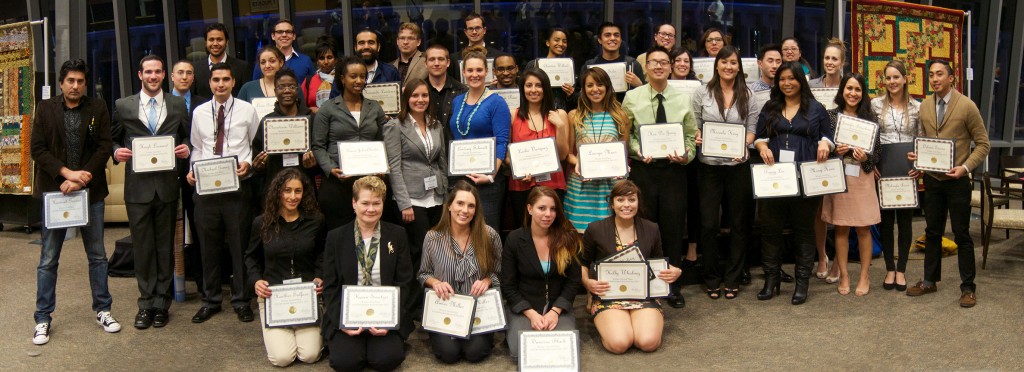[Editor’s Note: Updated Feb. 27, 2013 with a red asterisk (*) next to the session winners who will represent the university at the 27th Annual CSU Student Research Competition on May 10 and 11 at California State Polytechnic University, Pomona]
Students at California State University, Dominguez Hills shared results of their scholarly research and creative endeavors through a record number of oral presentations that in many cases included multi-media components, as well as posters displayed on easels, during the university’s daylong Student Research Day on Feb. 21 held almost entirely in the Loker Student Union.

“It demonstrates that students are engaged in scholarship and academic excellence to the utmost extent to where we can have such wide-scale [participation at] Student Research Day. It shows the hard work and dedication of the students,” said senior Africana studies major and doctoral program-bound McNair scholar David C. Turner III. “It really prepares a lot of Dominguez Hills students for graduate school.”
Jose Lara-Ruiz, a senior majoring in psychology who plans to apply for a doctoral program in clinical psychology at Boston University, had his first experience with Student Research Day (SRD) as an observer last year, but this year he served as a student volunteer for the event, as well as presenting a poster in collaboration with fellow students Anais Franco and Candice Cochran on “Reliability and Factor Structure for a Brief Parent Social Support Scale among African American Adolescents.”
“It’s more experience that will help me in graduate school, and in making presentations,” he said of his experience at SRD, adding that volunteering also provided him with valuable insights into event management.
The experience for many presenters included questions from faculty and staff judges, as well as spectators.
Associate professor of interdisciplinary studies and coordinator of the labor studies program Vivian Price said she likes to ask students questions “that probe their ideas about why they are doing the research.”
“It gives them a chance to express themselves personally in a way that the formal presentation might not allow,” she said.
Price, who has served as a judge at nearly every SRD, now in its eighth year, and served as a member of the planning committee two of those years, pointed out that questions such as one posed by Tayyeb Shabbir, professor of finance and director of the Institute of Entrepreneurship, Accounting, Finance, and Law, were aimed to discover how students might pursue their research further once in graduate school.
“This question offers students yet another opportunity to discuss the limitations or strengths of their research methods and their thoughts on developing different approaches to their work,” Price noted.
Turner, who presented at the event for the third time, said that by being familiar with the presentation process, in addition to feeling more calm and collected, he was better able to respond to such questioning. His presentation this year, “Do They Really Care About Us? Investigating Masculinity, Victimization, and Student Teacher Conflicts with Black Males at an Urban High School: A Critical Race Study,” won him second place in a behavioral and social science session.
“As far as developing me as a scholar … able to engage in literature, the questions really helped,” he said.
Whether students were first-time presenters or SRD veterans, they participated in record numbers since the event began in 2005. Acting associate vice president of Research and Funded Projects and emeritus professor of biology Laura Robles, who was SRD co-coordinator this year, said the first SRD was hosted in the Extended Education Complex, which easily accommodated 63 oral presentations and 11 posters, compared to 147 and 27 respective presentations in the student union this year. Faculty and staff mentors proportionately increased from an initial 33 to more than 60 this time around.
“SRD is an effort by a lot of people. No one person can do this by themselves anymore,” Robles said.
Her co-coordinator Louis Mark Carrier, professor and chair of the psychology department, may know this better than anyone. Although he has served as a mentor or judge since SRD began, in 2012–his first year to coordinate the event–he did so alone. He may also be more relieved than anyone that help comes from throughout the campus.
“The nice thing about working with Laura is that she has been involved since the beginning. She knows all the ins and outs. …She has so much institutional knowledge,” Carrier said.
But he was quick to point out that student volunteers make the event possible.
“I think the student committee volunteers are most impressive. Every year we get a new group of students who have never done it before; never run the behind-the-scenes at a conference. They have really stepped up to the plate,” he said.

One such student is Mike Gomez, a senior majoring in psychology, McNair Scholar, member of the Psychology Society, and a second-year presenter. After volunteering at the sign-in desk in 2012, he wanted to do more. So, in October 2012 he applied to serve as the chair of the student committee for SRD this year.
After being selected last fall, he immediately started working on the event, beginning with designating four students to serve on the student committee. Part of his duties included supervising more than 60 student volunteers that he and the student committee recruited from classes and clubs on campus. The volunteers composed letters to solicit donations from regional companies, and on the day of the event assembled presenter bags, and printed participant badges.
Using a spreadsheet, Gomez coordinated student monitors at each of the nine rooms – three ballrooms and six meeting rooms, as well as the outdoor patio where the poster presentations were displayed.
“It kind of came full-circle. Now I was in charge of students working as volunteers. [Being the student committee chair] is a great opportunity. There’s personal benefit, but I really just get a lot of enjoyment seeing all the students get a chance to present their work,” said Gomez, who in addition to his committee duties made two presentations; one was “Assessment of Continuous Partial Attention,” for which he won first place in a behavioral and social sciences session.
There are other kinds of firsts at SRD, such as the creative arts category, included during last year’s event for the first time. New this year was a distance learning category.
Students in the distance learning program delivered their presentations remotely via Blackboard Collaborate from the University Library. Nina Bodway, a student in the Humanities (HUX) Master of Arts program, presented “Beyond the Canvas: Pablo Picasso’s Les Demoiselles d’Avignon and the Role of the Viewer in Creating Meaning, ” and Master of Business Administration student Honora Whitfield presented “A Framework for Holistically Addressing Integration Issues in IS Projects.” Bodway was recognized with the Special Award for Pioneer in Distance Presentation.
“They have a distance learning center lab at the Library that [Information Technology] staff told us would run smoothly. Those were the only presentations that weren’t in the student union. There were judges. We ran it just like the other sessions,” Carrier said. “If we have enough students next year to run a complete session that would be a great opportunity because we have hundreds and hundreds of Cal State Dominguez Hills students who don’t come to the campus. …They’re doing projects, papers, all kinds of great things that could be featured here.”

Another innovation is that the 10 winning teams selected to present at the CSU systemwide Student Research Competition in May will present their work again during a campus-wide Student Research Day Symposium in April, in front of an expected crowd of as many as 300 to 400 people. Carrier said audience members will be mainly students from classes on campus, and, as part of a recruitment effort, off-campus groups such as high school students will be invited. The symposium will be open to all.
“It’s really Provost Ramon Torrecilha’s idea,” Carrier said of the symposium. “It’s not competitive; it’s a chance for the 10 winning teams to be in the limelight. Students can rework and perfect their presentations. And their mentor will be there to introduce them, and maybe lay the background for the research.”
Via a video message broadcast during the SRD luncheon, Torrecilha told student participants, “We are here to celebrate your accomplishments. CSU Dominguez Hills is committed to academic excellence and to student success. Student Research Day clearly demonstrates that through the transformative power of research our students are contributing to the expansion of knowledge. Congratulations to you all. Well done.”
Not only are students contributing to the expansion of knowledge, they are contributing solutions to real-life problems, some right here on campus. Seniors Carolina Lopez, a geology major with an earth science option, and Ri Ek, a geology major with an earth and environment option, collaborated on research and presented a poster “Enlighted will Light the Way,” a proposal and project that supports campus sustainability efforts.
“Our project is important because it helps our school save money. Light is money. Money is huge concern for the campus, as well as energy efficiency and setting an example for other universities,” Ek said.
Lopez added that the campus is striving to reduce its carbon footprint. The women further explained that the installation of Enlight, an intelligent energy sensor system, has already been implemented in the hallways of Welch Hall and has proven to save enough energy to reduce the cost by 83 percent.
According to their faculty mentor and lecturer of earth sciences Judy King-Rundel, their work led directly to the planned installation of the Enlight system in building two of the Small Academic College. Kenny Seeton, the manager of the university’s central plant, said he leveraged the student’s project to persuade Enlight to donate the materials for this installation.
“I think research provides information needed to push change to improve our campus and make it more sustainable,” Ek asserted.
University Interim President Willie J. Hagan applauded such efforts during his luncheon keynote address.
“This is really important work that our students are doing,” he said. “There are so many topics. … Every one of those topics were addressing real-world issues. Issues that had meaning for individuals, issues that had meaning for corporations, and issues that had meaning for society in general.
“I was extraordinarily impressed by what I saw. This day truly is a gift.”
The day was capped off with an evening reception on the fifth floor of the south wing of the Library honoring SRD participants and announcing session winners. First place winners received $100, and second place winners were given $50. The 10 overall winning teams had not been announced as of publication.
For more information on Student Research Day, and for a complete schedule of 2013 presentations and abstracts, visit http://www.csudh.edu/RF/student_research_day_2012/default.shtml.

2013 STUDENT RESEARCH DAY SESSION WINNERS
BEHAVIORAL AND SOCIAL SCIENCES I
First Place
Hugh Leonard, Psychology
The Unexpected Classroom: Using Online Chat to Enhance Subsequent Face to Face Communications
Faculty Mentor: Mark Carrier, Psychology
Second Place
Kelly Whaling and Aimee Miller, Psychology
Explaining Technology’s Disruption of our Sleep through Structural Equation Modeling
Faculty Mentors: Mark Carrier and Larry Rosen, Psychology
BEHAVIORAL AND SOCIAL SCIENCES II
First Place
Geraldy Eisman, Walter Lopez, Lauryn Maes, Diego Garcia, Victoria Moss and Monique Turner, Psychology
The Relationship between Time Perspective and Neuropsychological Test Performance
Faculty Mentors: Tara Victor, Psychology, and Maria E. Cottingham (Defense and Veterans Brain Injury Center, Camp Pendleton)
Second Place
Alex Solis, Jordan Lacayo, Christen Willard and Andrea Casillas, Psychology”
The Impact of Texting on Impression Formation
Faculty Mentor: Silvia Santos, Psychology
BEHAVIORAL AND SOCIAL SCIENCES III
First Place
Alexxandra Salazar, Anthropology
Moni Mekhala and Ream Eyso: Honoring the Spirits and Transmitting Culture through Ritual and Performance
Faculty Mentor: Susan Needham, Anthropology
Second Place
David Turner III, Africana Studies
Do They Really Care About Us? Investigating Masculinity, Victimization, and Student Teacher Conflicts with Black Males at an Urban High School: A Critical Race Study
Faculty Mentor: M. Keith Claybrook, Africana Studies
BEHAVIORAL AND SOCIAL SCIENCES IV
First Place
* Brenna Smith, Anthropology
Massive Earthworks in the Western Amazon
Faculty Mentor: Jerry Moore, Anthropology
Second Place
Diana Ochoa, Anthropology
Discerning Site Distribution and Settlement Patterns in Andahuaylas (Apurimac), Peru
Faculty Mentors: Jerry Moore, Anthropology, and Danielle Kurin (Universidad Nacional Jose Maria Arguedas, Peru)
BEHAVIORAL AND SOCIAL SCIENCES V
First Place
* Michael Gomez, Psychology
Assessment of Continuous Partial Attention
Faculty Mentor: Mark Carrier, Psychology
Second Place – Tie
Vanessa Black, Kelly Whaling, and Aimee Miller, Psychology
Psychological Risk Factors for Becoming a Victim of Human Sex Trafficking
Faculty Mentor: Mark Carrier, Psychology
Second Place – Tie
Brandon Finlay, Sociology
Critical Thinking and Corrections: The Potential Impact of Higher Education on Recidivism
Faculty Mentors: Jose Prado, Sociology, Sora Han and Susan Coutin (University of California Irvine)
BIOLOGICAL AND AGRICULTURAL SCIENCES
First Place
Alfred Fernandez, Biology
Analyses of an Asxl1 Knockout Mouse Model
Faculty Mentors: Hee-Kwang Choi, Biology, Feng-Chun Yang, Mingjiang Xu, Zhaomin Li, Jiapeng Wang, Zhe Li and Yongzheng He (Indiana University-Purdue University Indianapolis)
Second Place
Jose Victorino, Rachel Gasaway and Mason Anthony Brown, Biology
Targeting the Mitotic Kinase, MPS1, for Breast Cancer Therapy
Faculty Mentors: Helen Chun, Biology, Brenda Grimes, Roger Slee, and Brittney-Shea Herbert (Indiana University-Purdue University Indianapolis)
COMPUTER SCIENCE AND COMPUTER INFORMATION SYSTEMS
First Place
Matthew Roesger, Computer Science
Determining Acceptable Error Threshold of Biometric Fingerprint Security
Faculty Mentor: Antonia Boadi, Computer Science
Second Place
Samori Price, Computer Science
AUV Joystick Simulation Test for Detecting Mines and Obstacles
Faculty Mentor: Antonia Boadi, Computer Science
CREATIVE ARTS
First Place
* Dalia Cornejo, Art and Design
“Destroy the Box” Project
Faculty Mentor: Michele Bury, Art and Design
Second Place
* Elvia Martinez and Ruth Morales-Mazariego, Art and Design
A Visual Presentation About Homelessness
Faculty Mentor: Michele Bury, Art and Design
HEALTH, NUTRITION AND CLINICAL SCIENCE I
First Place
* Mony Hean, Edward Kim and Peggy Lee, Occupational Therapy
The Experience of Minority Parents Raising a Child with Autism: A Phenomenological Study
Faculty Mentor: Claudia Peyton, Occupational Therapy
Second Place – Tie
Hee Do Jang and Micaela King, Occupational Therapy
The Effects of Spinal Cord Injury on Motherhood
Faculty Mentor: Claudia Peyton, Occupational Therapy
Second Place – Tie
Kiara John-Charles and Danielle Luther, Occupational Therapy
Foster Youth Transition into Independent Living: A Narrative Study
Faculty Mentor: Claudia Peyton, Occupational Therapy
HEALTH, NUTRITION AND CLINICAL SCIENCE II
First Place
Katrin Saputra, Samuel Stout and Karen Sweitzer, Occupational Therapy
Antecedents to Seeking Vision Services for Older Adults
Faculty Mentor: Claudia Peyton, Occupational Therapy
Second Place
Heather Sulfaro, Gaelle Simmonds and Lindsay Schmidt, Occupational Therapy
The Experience of Combat Veterans Transitioning from Operations Iraqi Freedom and Enduring Freedom: A Phenomenological Study
Faculty Mentor: Claudia Peyton, Occupational Therapy
HEALTH, NUTRITION AND CLINICAL SCIENCE III
First Place – Tie
Megan Arquette, Mikayla Avrea, Jennifer Brueckner and Orland Garcia, Occupational Therapy
Hippotherapy: A Storied Perspective From Caregivers and Therapists
Faculty Mentor: Claudia Peyton, Occupational Therapy
First Place – Tie
* Gary Barden, Health Science
Cross National Comparison of the Effects of Parental Strictness of Rules on Adolescents’ Well-being in Italy and the Netherlands
Faculty Mentor: Enrique Ortega, Health Science
Second Place
Amy Bisogni, Ashley Bossier, Debbie Edwards and Melanie Hamel, Occupational Therapy
Relationships Between Humans and their Companion Animals: A Qualitative Study
Faculty Mentor: Claudia Peyton, Occupational Therapy
HUMANITIES AND LETTERS I
First Place
* Livia Bongiovanni, English
“Ambiguous Alternations”: Gender Transgression and Vampire Liminality in Le Fanu’s “Carmilla”
Faculty Mentor: Debra Best, English
Second Place
Amanda Reyes, English
A Walk Through Composition: “Take A Walk Tuesday”
Faculty Mentor: David Sherman, English
HUMANITIES AND LETTERS II
First Place
* Oluwatosin Williams, Africana Studies
Animated Othering: A Cultural Perspective of the Top-Grossing Animated Films of 2012
Faculty Mentor: Salim Faraji, Africana Studies
Second Place
Fernando Landeros, Art and Design
Finding “Akathisia” in Van Gogh’s Brush Strokes
Faculty Mentors: Kathy Zimmerer, University Art Gallery and Kirstin Ellsworth, Art and Design
PHYSICAL AND MATHEMATICAL SCIENCES
First Place
* Harneet Grewal, Physics
Reflectivity Tests on the CLAS12 High Threshold Cerenkov Counter (HTCC) Mirror Assembly Located at the Thomas Jefferson National Accelerator Facility
Faculty Mentor: John Price, Physics
Second Place
* Aaron Hoffman, Mathematics
City of Numbers: The Units over Fields of Prime Order
Faculty Mentor: Matt Jones, Mathematics
POSTERS – MORNING
First Place – Tie
Vanessa Black, Kelly Whaling, Leslie Vasquez and Stephanie Dus, Psychology
Measuring the Effectiveness of Dialectical Behavior Therapy with Adolescents in a Community Mental Health Setting
Faculty Mentors: Mark Carrier, Psychology, and Michele Berk (Los Angeles Biomedical Research Institute)
First Place – Tie
Victor Canela, Biology
Inhibition of FAK as a Potential Therapeutic Option in Treating FLT3 and c-Kit Induced Leukemogenesis
Faculty Mentors: Hee-Kwang Choi, Biology, and Reuben Kapur (Indiana University School of Medicine)
POSTERS – AFTERNOON
First Place
Jamila Thomas, Psychology
Cyberbullying
Faculty Mentor: Silvia Santos, Psychology
Second Place
Krysten Gonzalez, Monica Zare, Steve Villalpando, Scott Matsumura and Sandra Alfaro, Psychology
The Efficacy of Mobile Phone Text-Message Intervention to Promote Parent-Child Sex Communication among African American and Latina Mothers
Faculty Mentors: Carl Sneed, Psychology, and Sohaila Shakib, Sociology
DISTANCE LEARNING PROGRAMS
Special Award For Pioneer In Distance Presentation
Nina Bodway, HUX
Beyond the Canvas: Pablo Picasso’s Les Demoiselles d’Avignon and the Role of the Viewer in Creating Meaning
Faculty Mentor: Kirstin Ellsworth, Humanities